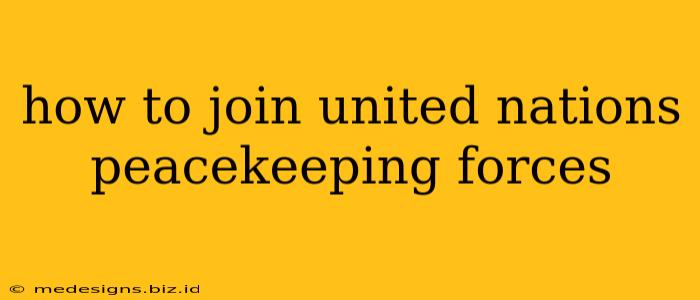Want to make a real difference in the world and contribute to international peace and security? Joining the United Nations Peacekeeping Forces (UNPKF) might be the perfect path for you. This comprehensive guide will walk you through the process, outlining the requirements, application steps, and what to expect.
Understanding UN Peacekeeping
Before diving into the application process, it's crucial to understand what UN peacekeeping entails. UN Peacekeepers are civilian, police, and military personnel deployed to conflict zones and post-conflict areas around the globe. Their mission is to:
- Maintain peace and security: Preventing further violence and protecting civilians.
- Facilitate political solutions: Supporting peace negotiations and reconciliation efforts.
- Provide humanitarian assistance: Delivering essential services and supporting vulnerable populations.
This is demanding work, often in challenging and dangerous environments. It requires dedication, resilience, and a strong commitment to upholding peace and human rights.
Eligibility Requirements: Are You Qualified?
The eligibility criteria for joining UN Peacekeeping vary depending on the specific role (military, police, or civilian) and the mission's requirements. However, some general requirements apply across the board:
- Citizenship: You must be a citizen of a country that contributes troops or personnel to UN peacekeeping operations. Check with your government's relevant ministry (typically defense or foreign affairs) to see if your nation participates.
- Medical Fitness: You must be in excellent physical and mental health, able to withstand demanding conditions and potentially hazardous situations. Rigorous medical evaluations are standard.
- Security Clearance: A thorough background check is essential to ensure suitability for the sensitive nature of peacekeeping work.
- Professional Qualifications: Specific qualifications are needed depending on the role. Military personnel need relevant experience and training. Police officers require law enforcement experience. Civilian personnel may need specific skills in areas such as engineering, medicine, or logistics.
- Language Proficiency: Fluency in at least one of the UN's working languages (English, French, Arabic, Spanish, Chinese, Russian) is usually required. Additional language skills are highly desirable.
The Application Process: Step-by-Step
The application process can be lengthy and competitive. It usually involves these steps:
1. Contact Your Government:
This is the crucial first step. Contact your nation's ministry of defense or foreign affairs to inquire about opportunities to participate in UN peacekeeping. They will provide information about current deployments and the application procedure specific to your country.
2. Gather Required Documents:
Prepare all the necessary documentation, which typically includes:
- Resume/CV: Highlighting relevant skills, experience, and qualifications.
- Educational certificates: Proof of educational attainment.
- Military or police records: If applicable, showcasing service history and performance.
- Medical certificates: Confirming physical and mental fitness.
- References: Letters of recommendation from supervisors or other professionals who can attest to your character and abilities.
3. Submit Your Application:
Follow the instructions provided by your government to submit your application. This might involve an online application, a hard copy submission, or a combination of both.
4. Selection Process:
The selection process is rigorous and includes several stages, such as:
- Initial screening: Review of your application documents.
- Interviews: Assessment of your skills, experience, and suitability for peacekeeping.
- Physical and psychological evaluations: To assess your fitness for the demanding work.
- Security clearance process: Thorough background checks.
5. Pre-Deployment Training:
Successful candidates will undergo extensive pre-deployment training to prepare them for the challenges and responsibilities of peacekeeping operations. This training covers various aspects, including:
- Security procedures: Self-protection and response to threats.
- Cultural awareness: Understanding the local culture and customs.
- Human rights: Respecting human rights and international humanitarian law.
- Conflict resolution: Techniques for managing conflict peacefully.
What to Expect as a UN Peacekeeper
Life as a UN Peacekeeper is demanding and often challenging. You'll likely face:
- Dangerous situations: Exposure to violence, conflict, and potential threats to your safety.
- Difficult living conditions: Basic living conditions and limited resources are common.
- Cultural differences: Adapting to a new culture and working with people from different backgrounds.
- Emotional toll: Witnessing suffering and hardship can take an emotional toll.
However, the rewards are significant. You will be making a tangible contribution to international peace and security, contributing to a more stable and just world.
Remember: The specifics of the application process will vary depending on your nationality and the particular UN peacekeeping mission. Always check with your government's relevant authorities for the most up-to-date and accurate information. Good luck!
